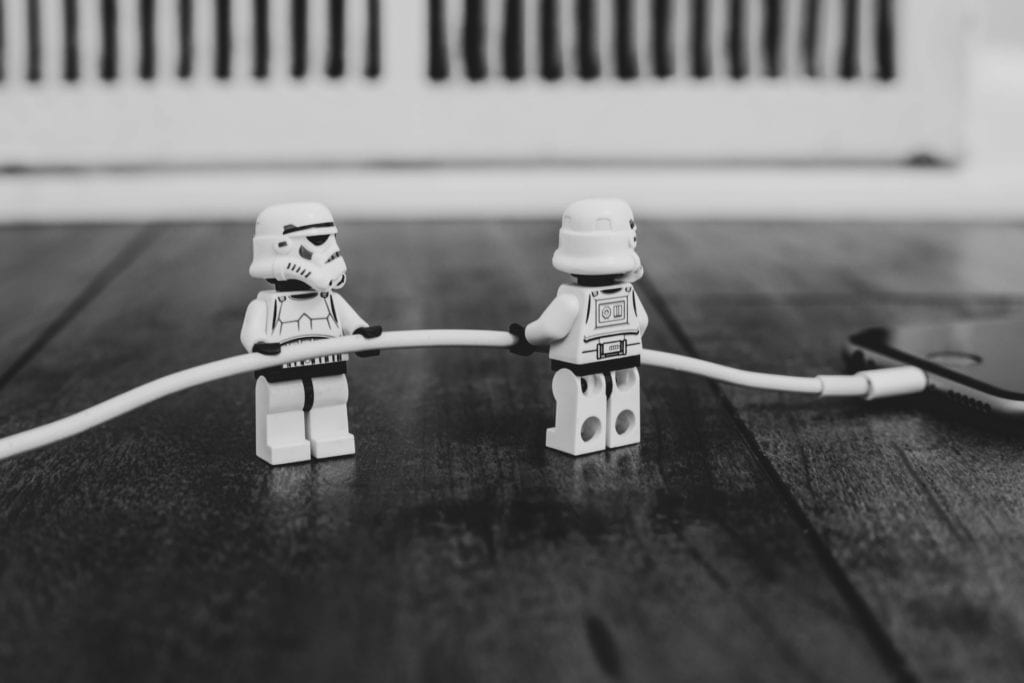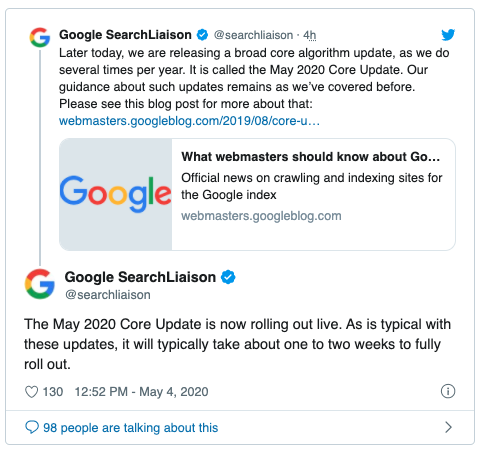Today, Google confirmed that it’s rolling out a new core algorithm update. It’s unimaginatively called the “May 2020 Core Update.”

How will the May 2020 Core Update Affect Your Website?
This gives new meaning to the phrase: “May the Fourth Be With You.”
You can find an update on how the Google May 2020 update is affecting different industries so far, here.

Google won’t say. But I’m certain you’ll soon find out.
Google’s Danny Sullivan tweeted about the update earlier today. He also said that the company’s guidance remains the same as it has in the past.
That is to say, there’s absolutely no action you need to take in response to the update.
In case you’re unfamiliar with the party line during these types of updates, it’s that you don’t need to worry about the algorithm change. Just get on with life as you normally would.

Here’s what Google says about periodic algorithm changes:
Several times a year, we make significant, broad changes to our search algorithms and systems. We refer to these as “core updates.” They’re designed to ensure that overall, we’re delivering on our mission to present relevant and authoritative content to searchers. These core updates may also affect Google Discover.
However, just because Google says that you don’t need to take any action in response to the May 2020 Core Update, that doesn’t mean that nothing will happen to your rankings.
This might be your first time attending a Google dance.
Your keywords will likely bounce around from one spot to another while the algorithm works its way through the system. Search terms that were landing you top spots in the search engine results pages (SERPs) in the past might put you on Page 3 nowadays.
What Can You do to Hold your Rankings in the May 2020 Core Update?
Again, nothing. Google says these kinds of rating gyrations are perfectly normal.
Some people win by jumping to the top. Others lose by moving from the first page of the search results to the second.
Google says there’s nothing necessarily “wrong” with pages that lose rank. They aren’t subject to manual actions and they haven’t necessarily violated the Google webmaster guidelines.
It’s just that Google’s new algorithm has determined that some pages are more suitable for certain keywords than yours. That’s all.
Here’s some more insight from Google with a relevant analogy:
One way to think of how a core update operates is to imagine you made a list of the top 100 movies in 2015. A few years later in 2019, you refresh the list. It’s going to naturally change. Some new and wonderful movies that never existed before will now be candidates for inclusion. You might also reassess some films and realize they deserved a higher place on the list than they had before.
Google offers lots of general advice on providing content that ranks well. But it all comes down to two words: user experience.
Does the content you’re writing offer quality advice/research/guidance on the keyword you’ve selected? If so, then it should rank well.
Here’s another question: does the content you’re writing offer better advice/research/guidance than what your competitors are providing on their websites?
If not, then you know why you dropped.
So if you want to get to the point where you don’t have to worry about doing the Google dance every time there’s a core algorithm update, make sure that you’re producing the kind of content that resonates well with your target audience.
Take a look at the dwell time metric on your web pages. If you find that people are bouncing away after only a few seconds, that’s a sure sign that your content isn’t worth reading.
Don’t be surprised if you lose rank in that case.
In the meantime, pay attention to your rankings over the next few weeks. Once the dance is over, look at where your keywords have “landed.”
That’s probably where they’ll stay for quite some time.
